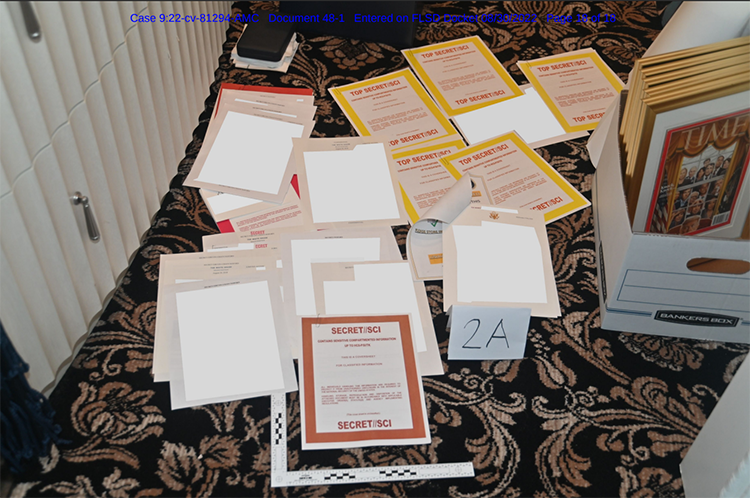
Trials & Litigation
Unclean hands and executive-privilege scope debated soon after decide necessitates specific master in Trump situation

Image from Department of Justice.
Up to date: Lawful industry experts are expressing shock about two aspects of U.S. District Choose Aileen M. Cannon’s final decision to appoint a special grasp to assessment paperwork seized from previous President Donald Trump’s Mar-a-Lago property.
Gurus are amazed that the particular learn will be permitted to critique the documents for claims of executive privilege in addition to attorney-shopper privilege. And they are amazed the judge stopped federal prosecutors from applying the resources in their criminal investigation during the overview.
At least one skilled also concerns no matter if Cannon experienced the equitable-jurisdiction authority to act mainly because of Trump’s “unclean hands” in retaining delicate paperwork.
The U.S. Justice Department stated it would attractiveness to the Atlanta-based mostly 11th U.S. Circuit Courtroom of Appeals in a see filed on Sept. 8, the Washington Put up experiences.
The authorities is inquiring Cannon to keep the portion of her ruling that helps prevent the FBI and the Justice Department from examining and making use of the seized categorised files in the ongoing criminal investigation, Regulation.com reports. The keep would stay in put pending charm.
Publications with stories and op-eds on Cannon’s final decision consist of CNN (in this article and here), the New York Occasions and Slate. Authorities tweeted their thoughts right here and here.The Volokh Conspiracy, meanwhile, considers the scope of “equitable jurisdiction,” one particular of the grounds that Cannon cited (together with “inherent supervisory authority”) for her authority to have to have the unique master.
Cannon is a federal choose in the Southern District of Florida. Her Sept. 5 purchase authorizes appointment of a particular grasp to critique the seized home for private goods and materials that could be subject to attorney-client and govt privilege.
Cannon also barred the govt from examining and employing the seized content from investigative applications all through the evaluation. But Cannon permitted a classification assessment and intelligence evaluation by the Office of the Director of National Intelligence.
Some of the authorities who expressed shock that Cannon enjoined the criminal investigation are:
• Orin Kerr, a regulation professor at the College of California at Berkely. Kerr tweeted that appointing a specific grasp “is very odd” but “the even bigger deal” is enjoining use of the seized elements for investigative functions. “In the context of a contraband situation, exactly where proving the situation is all about utilizing the seized merchandise, that injunction quantities to a judicial takeover of the government branch’s investigation. I never see how a federal judge has the ability to do that.” If there are govt abuses, that has to be dealt with just after the actuality fairly than by way of an injunction, Kerr tweeted.
• Paul Rosenzweig, a previous homeland stability formal in the George W. Bush administration and prosecutor in the impartial counsel investigation of Invoice Clinton. He informed the New York Occasions that Cannon’s determination seems to be “genuinely unprecedented” and enjoining the prison investigation is “simply untenable.”
Some of the industry experts who expressed surprise about the govt-privilege critique are:
• Peter M. Shane, who is a authorized scholar in residence at New York College. He advised the New York Moments that government privilege commonly shields inner government department deliberations from disclosure. “Even if there is some hypothetical circumstance in which a previous president could protect his or her communications from the recent govt branch,” he said, “they would not be equipped to do so in the context of a legal investigation—and undoubtedly not after the content has been seized pursuant to a lawful search warrant.”
• Previous Performing Solicitor Standard Neal Katyal. He tweeted that govt privilege “isn’t some write-up-presidential privilege that lets presidents to continue to keep files immediately after they leave business. At most, it simply signifies these are executive files that should be returned to the archives. It doesn’t in any way, form or sort indicate they can’t be applied in a legal prosecution about stolen docs.”
• Previous White Residence ethics czar Norman Eisen and Democracy 21 founder Fred Wertheimer, who had been authors on an amicus transient in the files situation. They wrote in a Slate op-ed that the Presidential Records Act and lawful precedent show Trump “cannot successfully assert govt privilege from the executive department as it conducts executive capabilities.” They cite Nixon v. Administrator of Basic Expert services, a 1977 U.S. Supreme Court circumstance that upheld a federal law directing the GSA to seize previous President Richard Nixon’s presidential resources and to maintain those with historical price. The courtroom held the legislation didn’t violate the theory of separation of powers.
Creating at the Volokh Conspiracy, Notre Dame regulation professor Samuel Bray opines that Cannon didn’t have equitable jurisdiction in the case simply because of the unclean-arms basic principle and two other ideas of equity jurisdiction.
First, Bray suggests, a longstanding principle of fairness is that courts will not intervene in felony circumstances, and that features prison investigations by the U.S. Justice Division.
Second, courts just cannot training equitable jurisdiction absent a proprietary fascination for the plaintiff. Listed here, Trump has no property appropriate in the classified documents seized, even although he does have a ideal in his personalized products.
3rd, “equity gives no reduction to those people who occur into fairness with unclean fingers,” Bray claims.
“If previous President Trump commingled his individual results with categorised files belonging to the United States, then that is not a explanation to permit him to prohibit use of the government’s residence,” Bray writes. “Instead, that is a reason to deny him any aid to guard his individual property.”
Up-to-date on Sept. 8 to report on discover of attraction.



